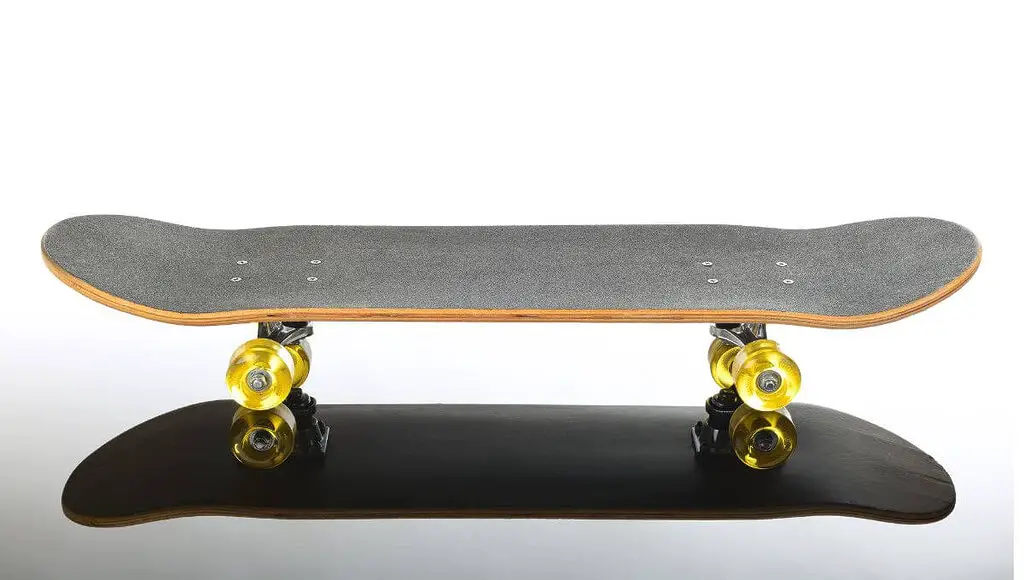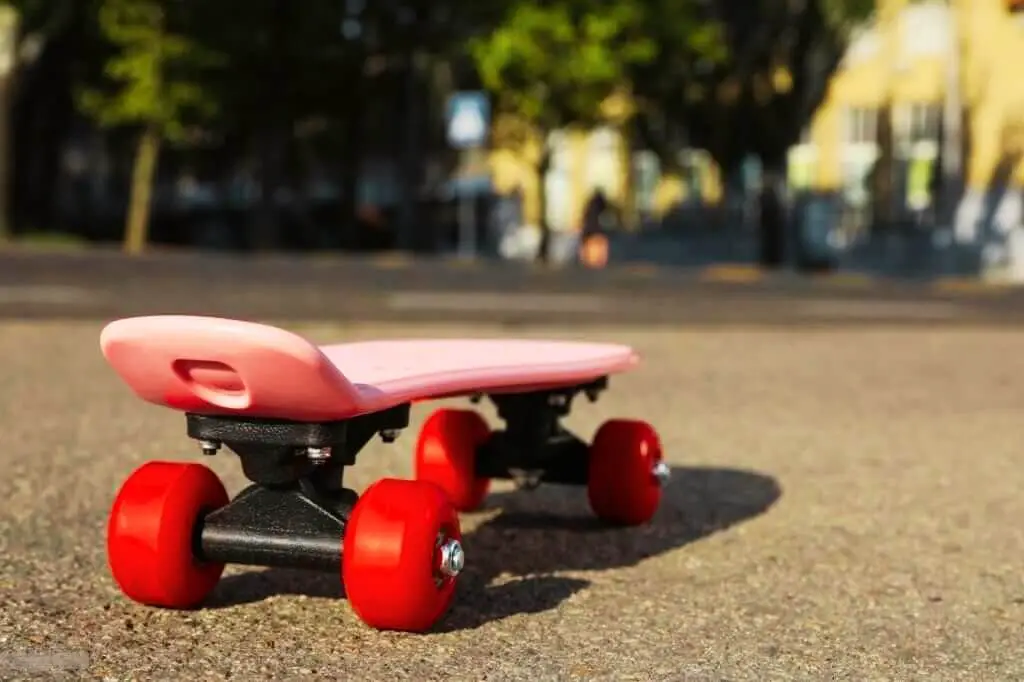If you’ve ever wondered, “How much does a skateboard deck weigh?”, you’re not alone. Whether you’re a seasoned skater or a beginner looking to buy your first board, understanding the weight of a skateboard deck is crucial for performance, comfort, and overall skating experience. Skateboard decks come in various shapes, sizes, and materials, all of which influence their weight.
But why does it matter? A lighter deck can make tricks easier to execute, while a heavier one might offer more stability for cruising.
In this guide, we’ll break down everything you need to know about skateboard deck weight, including the average weight range, factors that affect it, and how to choose the right deck for your style. By the end, you’ll have a clear answer to “How much does a skateboard deck weigh?” and the knowledge to pick the perfect board for your needs. Let’s dive in!
What is a Skateboard Deck Made of?
Maple wood is a popular choice for skateboard decks because it is strong, durable, and lightweight. It is also relatively inexpensive and easy to work with. Maple decks are also known for their pop, which is the amount of springiness or bounce that a deck has.
Bamboo is another popular choice for skateboard decks. It is lighter than maple and more sustainable, as it is a fast-growing plant. Bamboo decks are also known for their smooth ride and flex.
Other Materials that can be Used to Make Skateboard Decks Include:
- Carbon fiber: Carbon fiber is a strong and lightweight material that is often used in high-performance equipment. Carbon fiber decks are more expensive than maple decks, but they are also more durable and have a better pop.
- Fiberglass: Fiberglass is another strong and lightweight material that is often used in skateboard decks. Fiberglass decks are similar to carbon fiber decks in terms of performance and price.
- Plastic: Plastic decks are the least expensive type of skateboard deck, but they are also the least durable. Plastic decks are not recommended for serious skateboarding.
The type of material used to make a skateboard deck can affect its performance, durability, and price. It is important to choose a deck that is made from a material that is appropriate for your skill level and riding style.

How Much Does A Skateboard Deck Weigh?
The weight of a skateboard deck varies depending on a number of factors, including the size, shape, and materials used. However, most skateboard decks weigh between 1 and 2.2 kilograms (2.2 and 4.9 pounds).
Size and shape
Larger and wider skateboard decks tend to weigh more than smaller and narrower decks. This is because they require more material to construct. Additionally, decks with concave shapes (meaning that the center of the deck is lower than the edges) tend to weigh more than decks with flat shapes.
Materials
Skateboard decks are typically made from 7-ply maple wood. However, some decks are made from other materials, such as bamboo or plastic. Bamboo decks are generally lighter than maple decks, while plastic decks are heavier.
Construction methods
The construction method used to create a skateboard deck can also affect its weight. For example, decks that are made using a press tend to be heavier than decks that are made using a mold.
Other factors that can affect the weight of a skateboard deck include the type of glue used to bond the layers of wood together, the presence of any graphics or designs on the deck, and the type of grip tape used.
Average Weight of Skateboard Decks
The average weight of a skateboard deck is around 2-3 pounds (0.9-1.5 kilograms). However, this can vary depending on the size, shape, and construction of the deck. For example, a wider deck will typically be heavier than a narrower deck, and a deck made from a denser wood type, such as maple, will be heavier than a deck made from a lighter wood type, such as bamboo.
Here is a table of the average weight of skateboard decks of different sizes:
| Deck size (inches) | Average weight (pounds) | Average weight (kilograms) |
|---|---|---|
| 7.0 | 1.8-2.2 | 0.8-1 |
| 7.5 | 2-2.5 | 0.9-1.1 |
| 8.0 | 2.2-2.7 | 1-1.2 |
| 8.5 | 2.4-3 | 1.1-1.4 |
| 9.0 | 2.6-3.2 | 1.2-1.5 |
It is important to note that these are just averages. The actual weight of a skateboard deck can vary depending on the specific deck.
What Factors Affect the Weight of a Skateboard Deck?

When choosing a skateboard deck, one of the factors to consider is its weight. A lighter deck will be easier to flip and maneuver, while a heavier deck will be more stable and durable. The weight of a skateboard deck is affected by the following factors:
- Size: Larger decks tend to weigh more than smaller decks. This is because they require more material to construct.
- Thickness: Thicker decks tend to weigh more than thinner decks. This is because they contain more material.
- Material: Bamboo decks are typically lighter than maple decks. Bamboo is a strong and lightweight material, making it a popular choice for skateboard decks.
- Construction: Some decks are constructed with special features, such as cutouts or air pockets, which can reduce weight. These features can make the deck lighter without sacrificing strength or durability.
What is a Good Weight for a Skateboard Deck?
The weight of a skateboard deck is an important factor to consider when choosing one, but it is not the most important one. Other factors, such as the deck’s width, length, and shape, are more important for determining how it will perform and feel. However, the weight of the deck can still have an impact on your skating experience, especially if you are a heavier skater or if you do a lot of technical tricks.
Skateboard Weight At a Glance
Here is a skateboard weight chart comprising all the information we provided earlier. We made an extra row of longboards for comparison.
| Parts | Skateboard Average Weight (KG) | Skateboard Average Weight (lbs) | Longboard Average Weight (lbs) |
| Decks | 1 – 2.2 kg | 2 – 5 lbs | 7-8 lbs |
| Wheels | 0.2 – 0.25 kg | 0.44 – 0.55 lbs | 0.5 lbs |
| Trucks | Around 0.35 kg | Around 0.77 lbs | More than 0.25 kg |
| Grip Tape | 0.132 kg | 0.029 lbs | Around 0.15 kg |
| Bearings | 0.012 – 0.014 kg | 0.02 – 0.03 lbs | 0.025 lbs |
| Bushings | 0.05 kg | 0.125 lbs | |
| Hardware | 0.005 kg | 0.012 lbs |
How to Choose the Right Weight Skateboard Deck for you
When choosing a skateboard deck, it is important to consider the weight of the deck. The weight of the deck will affect your skating style, performance, and comfort.
- Skating style: If you are a street skater who likes to do tricks, you will want a lighter deck. Lighter decks are easier to flip and pop. If you are a park skater or like to ride vert, you may want a heavier deck for more stability. Heavier decks are also more durable and can withstand more impact.
- Height and weight: If you are a larger skater, you may want a heavier deck for more support. Heavier decks are also less likely to break. If you are a smaller skater, you may want a lighter deck for easier maneuverability.
- Personal preference: Ultimately, the best way to choose the right weight skateboard deck is to try out different decks and see what feels most comfortable for you.
Here are some general guidelines:
- Street skaters: Look for a deck that weighs between 2 and 2.8 pounds (0.9 and 1.3 kg).
- Park skaters: Look for a deck that weighs between 2.8 and 3.4 pounds (1.3 and 1.5 kg).
- Heavy skaters: Look for a deck that weighs at least 3 pounds (1.4 kg).
- Beginners: Look for a deck that weighs between 2.8 and 3.4 pounds (1.3 and 1.5 kg).
Does your Weight Matter on a Skateboard?

Yes, your weight can matter on a skateboard. Heavier skaters may find it more difficult to perform certain tricks, such as flips and pops. They may also be more likely to break their deck. However, heavier skaters can also generate more momentum, which can be helpful for certain tricks, such as grinding and sliding.
Here are some specific ways in which your weight can affect your skateboarding:
- Pop and flip: Heavier skaters may find it more difficult to pop and flip their board because they have more mass to move. This can make it more difficult to perform tricks like ollies and kickflips.
- Balance: Heavier skaters may also find it more difficult to balance on their board. This is because they have more weight to shift around.
- Deck durability: Heavier skaters are more likely to break their deck. This is because they put more stress on the deck when they land tricks.
- Momentum: Heavier skaters can generate more momentum. This can be helpful for certain tricks, such as grinding and sliding
How to Measure the Weight of a Skateboard Deck

Want to know the weight of your skateboard deck? Let’s dive into the simple steps and considerations:
How to measure the weight of a skateboard deck:
- Find a scale that can measure weights in pounds or kilograms. A kitchen scale will work just fine.
- Place the skateboard deck on the scale. Make sure that the deck is level and that the scale is not on a soft surface.
- Read the weight on the scale. This is the weight of the skateboard deck.
Additional tips for measuring the weight of a skateboard deck:
- If the scale does not have a setting for pounds or kilograms, you can convert the weight by multiplying by 2.2 to convert to pounds or dividing by 2.2 to convert to kilograms.
- If you are measuring the weight of a complete skateboard, you will need to measure the weight of the deck and the weight of the trucks, wheels, and bearings. Add the weights of each component to get the total weight of the skateboard.
The Impact of Deck Weight on Skateboard Trucks and Wheels
The weight of a skateboard deck can have a significant impact on the performance of the skateboard trucks and wheels.
Impact on skateboard trucks
- Heavier decks require stronger trucks: Heavier decks put more stress on the trucks, so they require stronger trucks to support the weight. This is especially important for heavier skaters or those who skate aggressively.
- Lighter decks can use weaker trucks: Lighter decks do not put as much stress on the trucks, so they can use weaker trucks. This can save weight and money, but it is important to make sure that the trucks are still strong enough to support the weight of the deck and the skater.
- The width of the trucks also matters: The width of the trucks also matters. Wider trucks provide more stability, but they also make the skateboard turn more slowly. Narrower trucks provide less stability, but they make the skateboard turn more quickly.
Impact on skateboard wheels
- Heavier decks can use larger wheels: Heavier decks can use larger wheels because they can support the weight. Larger wheels also provide more stability and make it easier to ride over rough terrain.
- Lighter decks can use smaller wheels: Lighter decks can use smaller wheels because they do not need to support as much weight. Smaller wheels also make the skateboard turn more quickly.
- The hardness of the wheels also matters: The hardness of the wheels also matters. Harder wheels are better for smooth surfaces, while softer wheels are better for rough surfaces.
If you are a heavier skater or you like to skate aggressively, you will need stronger trucks and larger wheels. If you are a lighter skater or you prefer to skate smoothly, you can get away with weaker trucks and smaller wheels.
pros and cons of light and heavy weight skateboard decks
Lightweight skateboard decks
Pros:
- Easier to maneuver: Lightweight decks are easier to turn and control, making them a good choice for street skating and tricks.
- More responsive: Lightweight decks are more responsive to your movements, making them a good choice for technical skating.
- Less fatigue: Lightweight decks are easier to carry and skate for long periods of time, making them a good choice for long distances or street skating.
Cons:
- Less stable: Lightweight decks may not be as stable as heavyweight decks, making them a poor choice for downhill skating or other activities that require a lot of stability.
- Less durable: Lightweight decks may not be as durable as heavyweight decks, making them more prone to breaking.
- More expensive: Lightweight decks are often more expensive than heavyweight decks.
Heavyweight skateboard decks
Pros:
- More stable: Heavyweight decks are more stable than lightweight decks, making them a good choice for downhill skating and other activities that require a lot of stability.
- More durable: Heavyweight decks are more durable than lightweight decks, making them less prone to breaking.
- Cheaper: Heavyweight decks are often cheaper than lightweight decks.
Cons:
- Heavier: Heavyweight decks are heavier than lightweight decks, making them more difficult to maneuver and control.
- Less responsive: Heavyweight decks are less responsive to your movements, making them a poor choice for technical skating.
- More tiring: Heavyweight decks are more tiring to carry and skate for long periods of time, making them a poor choice for long distances or street skating.
Ultimately, the best type of skateboard deck for you depends on your individual needs and preferences. If you are looking for a deck that is easy to maneuver and control, then a lightweight deck is a good option. If you are looking for a deck that is stable and durable, then a heavyweight deck is a good option.
Conclusion
Lance Mountain once said, “Skateboarding does not make you a skateboarder; not being able to stop skateboarding makes you a skateboarder.” Skateboarding is a passion; to get the best of it, you must explore the parts of a skateboard.
Knowing your skateboard better is the crucial point you need to concentrate on. Noticing the slightest things will create a difference between you and a regular skateboarder . How much does a skateboard deck weigh ? You know the answer now. But remember, the skateboard deck’s weight is essential when figuring out your goal.
Beginner skateboarders should stick to lightweight skateboards, giving them better control. Professionals will go for variable deck weight depending on their usage. So, explore your skateb
FAQ’s
What is the weight of a skateboard deck?
A skateboard deck typically weighs between 2 and 5 pounds, depending on its size and material. Lighter decks are great for tricks, while heavier ones offer more stability!
How heavy is an 8.0 skateboard?
An 8.0 skateboard typically weighs around 7 to 8 pounds. It’s a good balance for tricks and cruising!
Can a skateboard weigh 3 pounds?
Yes, a skateboard can weigh around 3 pounds, especially if it’s a lightweight model like a cruiser or mini skateboard!
What is the heaviest part of the skateboard?
The heaviest part of a skateboard is typically the deck, especially if it’s made of thicker or denser wood. The trucks and wheels also add weight, but the deck usually takes the lead!








